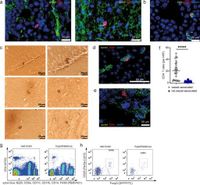In recent research, scientists have uncovered the crucial role of regulatory T cells (Tregs) in managing hypothalamic immune responses, which significantly impact systemic metabolism, particularly concerning obesity and type 2 diabetes (T2D).
Metabolic disorders like obesity and T2D present significant public health challenges, largely driven by unhealthy dietary habits that trigger immune responses in the central nervous system (CNS). This study illustrates how a high-calorie diet not only leads to weight gain but also disrupts the delicate balance of immune cells in the hypothalamus, a brain region critical for metabolic control.
Through experiments conducted on mice, researchers demonstrated that calorie-rich environments activate hypothalamic CD4+ T cells, reducing the number of protective Tregs that typically suppress inflammation. This imbalance contributes to metabolic dysfunction, which underscores the necessity of maintaining an optimal level of Tregs to mitigate immune activation in hypothalamic tissues.
The authors studied how hypothalamic CD4+ T cells exhibit a Th1-like activation state, displaying increased markers associated with immune activation while reducing markers that typically indicate cellular homeostasis. These findings reveal that Tregs are pivotal in controlling immune responses within the brain, particularly when exposed to a hyper-caloric diet.
Notably, the research indicates that increased activation of microglia and macrophages in the hypothalamus correlates with the metabolic impairments associated with high-calorie diets. The loss of Tregs exacerbates this activation, emphasizing their role as critical mediators in neuroimmune interactions. The study successfully connected the dots between chronic calorie intake, immune system responses, and metabolic disorders, providing a foundation for future therapeutic strategies that may involve Treg modulation to combat obesity and T2D.
Additionally, the results suggest potential avenues for precision immune modulation strategies, focusing on Tregs to restore balance in hypothalamic immune responses. These approaches could pave the way for novel treatment modalities aimed at alleviating the growing epidemic of metabolic diseases.
This research not only expands our understanding of the link between diet, immune function, and metabolism but also emphasizes the importance of further investigating the intricate mechanisms underlying neuroimmune interactions in the brain.

